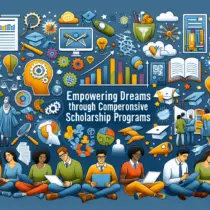How Remote Learning Scholarships Are Shaping the Future of Academia
Remote learning has become an ever-present part of modern education, especially after the COVID-19 pandemic accelerated its adoption. While the convenience and accessibility of remote learning are its most obvious benefits, the introduction of remote learning scholarships has further expanded its reach and influence. Scholarships tailored specifically for remote learners are shaping the future of academia in numerous ways.
First, remote learning scholarships make education more accessible to a broader audience. Traditional in-person learning often requires students to relocate, which can be costly and impractical for many. On the other hand, remote learning eliminates this need, and scholarships can offset other expenses, such as technology and internet access. This break from traditional barriers is exemplified by scholarships like the $5,000 Bioinformatics Research Grant, Australia 2024. This scholarship provides funds for remote learners specializing in bioinformatics who may not have access to such advanced courses locally.
Expanding Diversity and Inclusion
Remote learning scholarships also open doors for international students who may face visa restrictions, political instability, or financial limitations. An International scholarship makes it easier for these students to enroll in courses that might otherwise be inaccessible. By financing remote education, these scholarships promote global diversity and inclusion, allowing for a richer exchange of ideas and perspectives among students.
Bridging Technological Gaps
One significant challenge of remote learning is the technological gap. Not all students have access to high-quality devices or reliable internet connections. Fortunately, specialized scholarships can provide the necessary resources to bridge this gap. Scholarships that offer funds not just for tuition but also for technological support enable students from less privileged backgrounds to participate in remote learning effectively.
Encouraging Academic Innovation
Remote learning scholarships also promote academic innovation. The convenience of remote learning encourages students to explore a variety of subjects without the constraints of geographical location. As more students engage in remote learning, educators are motivated to create comprehensive and versatile curricula that cater to a global audience. Additionally, scholarships targeted towards specialized fields, like the $5,000 Bioinformatics Research Grant, Australia 2024, encourage students to venture into niche areas that require advanced technology and resources, thus promoting academic diversity.
Career Advancement Opportunities
Remote learning scholarships not only benefit traditional students but also professionals looking to advance their careers. Remote learning platforms offer a plethora of courses, from coding boot camps to specialized medical lectures, providing opportunities for career growth that were previously unattainable without taking time off work or relocating. Scholarships geared towards working professionals can cover expenses that might otherwise deter adult learners from enrolling in these programs.
Supporting Research and Development
Another pivotal impact of remote learning scholarships is the support for research and development. Grants aimed at specific research topics encourage students to delve into areas that have real-world applications. For instance, the $5,000 Bioinformatics Research Grant, Australia 2024 enables students to engage in cutting-edge research without the financial burdens typically associated with advanced studies. This support not only furthers individual careers but also fosters advancements in various fields of study, contributing to the collective academic and scientific community.
Reducing Student Debt
One of the most significant advantages of remote learning scholarships is their potential to reduce student debt. With the rising costs of higher education, scholarships provide much-needed financial relief. This financial support means students can focus more on their studies and less on part-time jobs or loans, ultimately leading to better academic outcomes and less financial stress post-graduation.
Fostering Lifelong Learning
Remote learning scholarships also foster a culture of lifelong learning. By providing financial support for various online courses and degree programs, these scholarships encourage individuals to continue their education at any stage of life. This continual pursuit of knowledge ensures that the workforce remains dynamic and adaptable, meeting the ever-evolving demands of the global economy.
Enhancing Collaboration and Networking
Remote learning naturally lends itself to global collaboration. Students from around the world can easily connect, share ideas, and work on projects together. Scholarships that facilitate this kind of interaction by funding collaborative platforms, virtual labs, and international seminars help in building a robust academic and professional network. These global connections enrich the learning experience, providing a wider range of perspectives and expertise.
Adapting to Future Challenges
As the world continues to change, so too must the academic institutions and their approaches to education. Remote learning scholarships play a crucial role in this evolution by providing the means for institutions to adapt and innovate. Scholarships enable schools to invest in new technologies, develop cutting-edge curricula, and offer courses that are relevant to the emerging needs of society. This proactive approach ensures that academic institutions remain resilient and responsive to future challenges.
Conclusion
In conclusion, remote learning scholarships are reshaping the future of academia in substantial and multifaceted ways. They make education more accessible and inclusive, bridge technological gaps, encourage academic innovation, and provide significant career advancement opportunities. Additionally, by supporting research and development, reducing student debt, fostering lifelong learning, enhancing global collaboration, and adapting to future challenges, these scholarships ensure that education continues to evolve and thrive in the digital age.
As remote learning becomes more ingrained in our educational landscape, the value and importance of scholarships tailored to this mode of learning will only continue to grow. From the $5,000 Bioinformatics Research Grant, Australia 2024 to various international scholarships, these financial aids are not merely funding educational journeys but are instrumental in constructing a resilient and innovative academic future.






